- Home
- James Grady
Shadow of the Condor Page 4
Shadow of the Condor Read online
Page 4
For six days Malcolm dodged pursuers, trying -to stay alive. For six days the killers and the American intelligence, community tore Washington apart looking for Malcolm and a girl he managed to convince to. help him. On the fifth day the girl was gunned down, almost killed. Malcolm, sure she was dead, abandoned the plan given him when the -old man and Kevin Powell had managed to contact him. Malcolm went after the opposition by himself. He finished the operation on the sixth day by capturing the opposition's betrayed leader and coldly killing the opposition's main agent when the man was helpless. Now Malcolm was on "extended leave, with pay and certain allowances," his reward for excellence in survival.
And in San Francisco, attending law school on a special government scholarship and only slightly impaired with a barely noticeable limp and blurred vision in one eye (for which she received special medical and pension privileges), was a girl who had risked her life for Malcolm, a girl who now wouldn't respond to letters, telephone calls or communications sent through third parties.
Oh, well, thought Malcolm, what is there to say? That was over, the whole thing, finished. He would never see Wendy again, or the agency, the old man, Kevin Powell, or any of them. He would coast through graduate school to his doctorate, find a nice small college and bury himself. No one would ever know, no one would ever care, and that suited him just fine. He took another sip of coffee.
The doorbell rang just as the Righteous Brothers started "Ebb Tide." Malcolm frowned. It wasn't the first of the month, and anyway, the landlord was aware he always paid by mail. It was the wrong time of year for door-todoor salesmen, none of the people he knew slightly at the university would ever call on him at home, and Malcolm had long since given up hoping for a beautiful, lonely neighbor looking for a cup of sugar. He shrugged his shoulders as be went to open the door.
"Hello, Malcolm," Kevin Powell said, "how are you?'
Malcolm stood looking at the neatly dressed, pleasant, middle-aged man in front of him. Malcolm's mind blanked. No vivid pictures flashed through his brain, no painful memories upset his heart. He looked at the man in silence for a long time before he quite calmly said, "No," then firmly shut the door.
The pictures and the memories came after the lock clicked shut. Malcolm leaned heavily against the doorjamb, his eyes pressed tightly shut. Ifs finally happened, he thought, they've finally come. Malcolm felt, but he wasn't sure exactly what he felt, except that the dominating emotion was relief. The waiting was finally over. He took several deep breaths before he opened the door again. Kevin was still there, smiling.
"I don't suppose shutting the door will do much good. I don1 think it could keep you out. You might as well come in this way."
Kevin didn't reply as he walked into the living room. He glanced briefly around. It looked like the photographs. He sat in the worn armchair next to the stereo.
"How have you been, Malcolm?"
"Don't you know?"
Belligerence, thought Kevin, antagonistic, defensive, slightly paranoid, just as Dr. Lofts predicted. Kevin knew better than to reply to the insinuation. "Do you have any more coffee?"
"Help yourself," Malcolm said grudgingly as he sat on the couch.
Kevin didn't pay an undue amount of attention to the slouching figure in blue jeans and a "Motherball" sweat shirt. He walked to the kitchen, found a cup while the water heated and made himself some coffee. He carefully carried it back to the living room and again sat in the chair. The two men watched each other as the stereo told about the joys of love. Then the record rejected and the machine fell silent.
"I suppose you're wondering why I’m here," Kevin said matter-of-factly.
"I have a hundred and one answers for that, but I'll just say yes, I'm wondering, but I really don't care because I'm through with you, finished, I won’t do any more of your crap. "What's the matter," sneered Malcolm, "are you afraid the taxpayers aren't getting their money's worth? Well, fuck that, I paid my way here, you know that!"
Good, thought Kevin, feelings of obligation. "It's your life, Malcolm, your choices, you know that. The old man agreed to. give you leave and salary for three years, no obligations, no debt, no hassles, no commitments. He didn't have to do that. He could have had you charged for murder one, either through channels or through the agency. You weren't following orders when you blasted Maronick. That was your own baby. The old man could have landed on you like a ton of bricks. But instead he was more than nice."
"I'm grateful." The sarcastic slur almost made Malcolm's words unintelligible.
"But you're not grateful enough to give us a little help."
"I knew it!" shouted Malcolm. "I knew you came around here for something! You want me back, you want me to help you, right?"
Kevin shrugged. "We have something you might be able to give us a little help on, nothing really big."
Malcolm crossed the room until he stood leaning over Kevin. Malcolm trembled as be spoke. "What is it, you want me to kill some more people for you? Get some more people shot? Forget it, I won't do it."
Kevin shrugged again and stood up, carefully pushing Malcolm away. "Fine, no problem. It make no difference to us if you vegetate here instead of doing something useful." He walked to the door.
"Well, that's what I'm going to do, I'm going to grow my own roots, thanks very much, but no thanks to you. So you can just forget whatever it is you want."
Kevin walked slowly toward the door. "Good luck. Your check will continue to come to this address. If you have any problems or questions, you know how to get in touch with us. I'll be in town until this evening, then I'm flying back to D.C. I'll be at the Terrace Hilton, room 606, until five, if you feel more amiable and want to chat. I'm registered as Mr. Rogers. Drop by if you like. I'll buy you a drink or a decent cup of coffee."
"Don't do me any more favors," said Malcolm, opening the door. "I've had quite enough. And don't wait around for me. I won't come. I won't."
Kevin -smiled at him before he walked from the room "Don't worry, Malcolm, I won't wait. I'll be seeing you."
"I won't come!" Malcolm ducked back inside and slamrned the door. For several minutes he excitedly paced the room. He roughly jerked the Righteous Brothers record up and flipped the reject lever. He turned the volume control up two levels. "Soul and Inspiration" blared through the speakers. Malcolm paced furiously through the whole song, then, after "Just Once in My Life" began, he sat down quickly on the couch and froze. Before the song was finished, he had begun to shake.
At 3:24 Kevin checked his watch for the ninth time. What if Malcolm didn't come? What if, I made the wrong moves? Kevin thought. He shook his head and glanced out the window. At 3:26 someone knocked softly on his door.
Even though he wasn1 on a mission, even though he was stateside, even though there was no one to expect trouble from, Kevin carefully stood to one side of the door, his hand under his suit coat lightly resting on his gun butt. "Yes?" he inquired.
"It's me."
Kevin knew the voice, but he had to be sure. "Who's me?
"Malcolm. Hell, Condor."
Kevin smiled to himself, then opened the door with a serious expression. The figure outside still wore jeans, but had replaced the sweat shirt with a shirt and sweater. The wind had mussed Malcolm's medium-length brown hair. It almost covered his blue eyes as he stared at a point directly in front of Kevin's feet. "Would you like to talk? I mean, would you mind?"
Kevin smiled. "Not at all, Malcolm. Not at all. In fact I’d like to talk. Come in."
Malcolm stepped inside the room. Kevin quietly closed the door behind him.
What the good doctor is saying," the old man had told Kevin the day before, "is that our Malcolm, our Condor, has no place to go but to us. He had to come to us, to work with us. Events are programmed that way. He has no other choice, and whether you attributed that to guilt over the deaths and taking our money, alienation, isolation, a strong sense of duty, boredom, a yearning for excitement or whatever, it all boils down to the same thing: He wil
l do it. Am I correct, Doctor?"
Dr. Lofts looked across the room at Kevin. The huge doctor is the chief psychiatrist for the CIA. His specialty is medically termed "behavior prognosis." The agency gives Dr.- Lofts the man to study and Dr. Lofts projects what the man would do in a given situation. Dr. Lofts and his team came into prominence when their evaluation of Nikita Khrushchev helped John Kennedy decide for the 'Cuban blockade. The doctor smiled. "I enjoy the way you cut through the medical folderol. Yes, I agree with you, Malcolm's ready to come over.
"Look at the signs. When he first moved to Cincinnati, he attended classes regularly, did all his assigned work and more. He ignored his hobby of escape through-violent fiction, a reaction to his involvement with the real thing. He tried to socialize with the other graduate students and professors, although that attempt was very brief. Now, almost a year later, he seldom goes to classes, the surveillance check shows him reading his type of fiction again and he sees almost no one. The world he found in Cincinnati doesn't correspond to the world he lived in so intensely for that brief period of time. He finds this new world dull and somewhat inane. Couple that with his guilt and feelings of duty, his natural inclination toward alienation, and he's ready to give us a try, if, and I must, emphasize again, if we don't push him into something too big, too deep, too arduous. That is very important, very important.
I should also should add," the doctor continued, "that our boy has a rather romantic view of what he would call 'absurd fate.' He'll come because he knows he'll come."
"What is the plan, sir?" Kevin asked the old man. "You haven't told me what I'm to do, let alone what Condor will be doing."
The old man smiled. "That's partially because I'm not sure how things will be done. Your job is simple. Backtrack Parkins, find out where he went and, if possible, why he went there. Then you do the same. Somewhere along the line I hope you'll tumble onto something or someone will tumble onto you. I wish you luck because Parkins evidently covered himself well. All the normal tracking procedures have failed. Be very careful because the opposition, whoever they are, will not want you bothering them as Parkins did.
"Malcolm's task is even simpler. As you know, I've been saving him until he's ready. He has such a lot of talent. I felt a little Long-term investment was in order on the chance that someday we could make him into -something very valuable. Because he's ready and -because action in his account will help justify the financial outlays we've had to make for our investment, we'll let him do the prying in Montana. A nice cover, nothing so elaborate that the opposition won't know who he is, but nothing so simple that the populace will figure out that he isn't what he seems. For the record, he'll be working for the bureau on loan to us. If my guess is right, he won't run into any trouble from the opposition. They won't want to stir things up after killing Parkins. Malcolm as our Condor may also draw their attention, allowing you, Kevin, a better chance to sneak in the back door."
"Will you provide any backup for Malcolm? If things get tough?"
"Well," continued the old man, "that will be difficult. It's a rural area. We can't move in too many strangers or the natives will know something is wrong and his cover will be blown. Some agency men will be staying at the air base eighty miles away from the town Condor will use as an operations center, but I don't think we can get anyone closer than that. You should have backtracked Parkins to that area in a week or ten days. Then the opposition will concentrate on you, and you can take care of yourself."
"Do you really think Malcolm can handle it, even if nothing goes wrong? Parkins' death makes this a little more than routine."
The old man smiled. Well, in any event, it will be interesting. Very interesting."
Kevin blinked his eyes after he relived that memory. He looked across the plane aisle to where Malcolm sat nodding. Malcolm's hour-long explanation that afternoon must have exhausted him, thought Kevin. For sixty minutes Malcolm had talked, sometimes slowly, sometimes shrilly. He shifted from dispassionate analysis of his "debt" to almost hysterical ramblings when he recounted his memories and fantasies. In the end he had looked at Kevin and said, "It really doesn1 make any difference, does it? I'm going because I have to go, I have to know, and the only way I'll know is by going."
"What do you want to know?" Kevin had asked.
"I don't know," Malcolm replied, "I don't know."
Early risers were just beginning to make their way through Moscow streets when Malcolm and Kevin were approaching Washington. One of the few Russians who walked briskly through the early morning was Nicholaus Ryzhov, a physical prototype for the bearlike Russian peasant. His proletariat ancestry showed in his lumbering workingman's walk and on his heavy muscled frame, which even at age sixty-three was hard and tough. But Ryzhov's clothes were cut more expensively than most of his fellow Russians', and he was no longer a peasant. He was a very important division commander in the committee for State Security of the Council of Ministers of the Soviet Union, the Komitet Gosudarstvennoye Bezopastnosti, better known as the KGB. Although the KGB is a civilian organization, its officers often hold military rank. When he took over his duties as a division commander, smooth-faced, tight-skinned, gray-haired Ryzhov chose to be a colonel. He could have been a general if he wished. Ryzhov strode on oblivious to the chilly morning. His bodyguards, who followed, flanked and preceded him at discreet distances, shivered, very, very silently cursing their chief's love of long, early morning walks.
The KGB is one of two major government branches in 'the Soviet Union concerned with espionage, the other branch being the KGB's smaller rival, the GRU, military intelligence. The KGB traces its roots as far back as 1881 and the Okhrana, the Department of State Protection, used by the czars as a secret police and intelligence agency. Less than two years after its inception the czarist espionage unit sent agents to the United States to keep track of Vladimir Legaev, an Okhrana defector who fled Mother Russia and became an American college professor. The czarist Okhrana also kept track of potential troublemaking Russians who stayed at home. For example, an Okhrana file card, dated May 1, 1904, notes that the second and third toes of one Joseph Stalin's left foot were grown together, producing a webbed-foot effect.
The secret police and intelligence system which in post-revolutionary days replaced the Okhrana operated in basically the same fashion as its czarist predecessor, but under a variety of changing names and initials, including the Cheka (Chrezvychainaya, Komissiya po Borbe s Kontr revolutisiei i Sabotazhem, ie., the Extraordinary Commission for Combating Counterrevolution and Sabotage), born December 20, 1917. Some Russians still refer to KGB agents as Chekists. In 1938, one Lavrenti Pavlovich Beria took the reins of the then NKVD, a position he held firmly until he was retired via bullet sometime late in 1953. Western intelligence sources disagree on the exact date of Beria's retirement. Russian civilian intelligence organized as the KGB was created the year after Beria’s retirement, on March 13, 1954. Like all its predecessors, the KGB operates out of Lubianka, the massive Siamese-twin stone building, half prison, half KGB administrative headquarters.
Ryzhov liked to walk to work early. He relished the freedom to choose his working hours, to walk where he wanted, when he wanted. Many of his predecessors had their walking days abruptly cut short, many others are told where, when and even how to walk by jailers. Ryzhov liked the crisp, clean, fresh, almost country like morning air. By midmorning traffic and factory smoke tinges the air with odors unpleasant to his peasant nose. Not as unpleasant as those of Los Angeles or other Western cities which he has visited, but unpleasant enough.
That day Ryzhov didn't have time to dwell on his normal reveries.
Unlike Malcolm, Ryzhov knew exactly what he wanted to know. He wanted to know that everything in his project was well, he wanted to know that beyond the slightest shadow of "practical doubt," the term Russian intelligence bureaucrats use to describe the limits of the unthinkable. But Ryzhov knew everything in that project was not well, just as he knew it would be up to him to make it we
ll.
The black limousine pulled slowly, respectfully to a stop in front of the toy store across the street from Lubianka and twenty feet from Ryzhov. The chauffeur bounded out to open the passenger door for Ryzhov, but the big man shook his head and instead motioned for the car's passenger to join him on the sidewalk. The short, slightly portly, middle-aged man who nervously emerged from the car was Vladimir Serov, like Ryzhov, a colonel in the KGB, although the smaller Serov is nowhere near Ryzhov in actual rank. Ryzhov commands the division, Serov merely runs one bureau in the division. True, it is an important bureau, the bureau which nominally oversaw Ryzhov's pet project, but it is only a bureau. Given the normal constrictions of KGB operation, Serov runs his bureau with a fair degree of independence, except when it came to Ryzhov's pet project, Gamayun. There Serov commanded in name only, taking orders directly from Krumin, the agent he supposedly commanded, or from Ryzhov, the division commander, who normally should not bother with individual projects. Serov did not like working between his agent, Krumin, and his commander, Ryzhov. He knew the relationship between the two men was complex, and he knew that both men considered him a mere tool in the -overall project. If anything were to go wrong, it probably would not be agent Krumin or Division Commander Ryzhov who would be blamed and punished. It would be Bureau Chief Vladimir Serov.

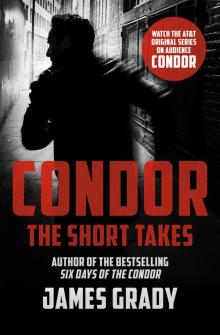 The Short Takes
The Short Takes Montana Noir
Montana Noir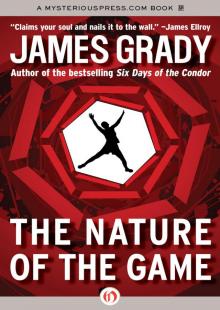 Nature of the Game
Nature of the Game Condor in the Stacks
Condor in the Stacks This Given Sky
This Given Sky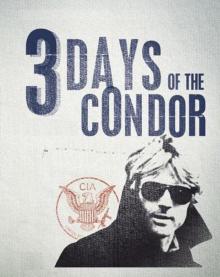 Three Days of the Condor
Three Days of the Condor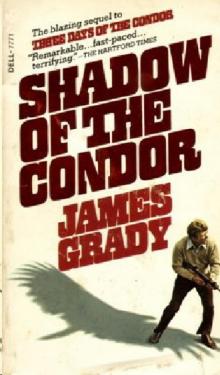 Shadow of the Condor
Shadow of the Condor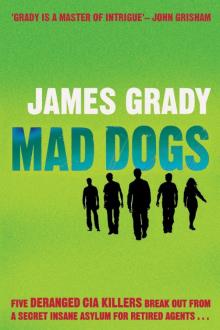 Mad Dogs
Mad Dogs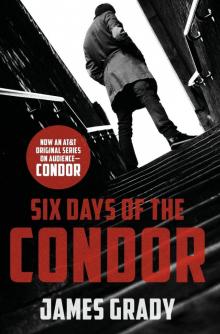 Six Days of the Condor
Six Days of the Condor Next Day of the Condor
Next Day of the Condor